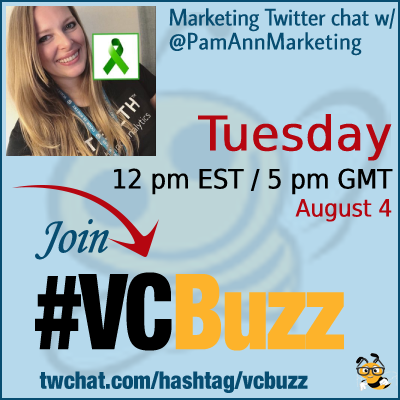
A drop in rankings is always every website owner’s nightmare.
But what if I tell you most of those are fixable, provided we know the cause.
So the first step is to… breathe. Then go on and figure out why your rankings have dropped.
Let’s discuss how!
***Add #VCBuzz chats to your calendar here.
***Please sign in here to follow the chat -> twchat.com/hashtag/vcbuzz
About @PamAnnMarketing
@PamAnnMarketing, M.B.A., is president of Pam Ann Marketing, LLC and founder of Stealth™ Search and Analytics.
She is widely recognized as an expert in search engine optimization (SEO), pay-per-click advertising (PPC), and digital analytics.
Pam has been interviewed by publications such as Internet Retailer magazine and CBS Small Business Pulse.
She has been honored with several awards for her small business leadership and non-profit advocacy work
Questions we discussed
Q1 How did you become a digital marketer? Please share your career story!
I created an online store for the company I was working for & thought that “If you build it, they will come.”
I quickly learned that you can’t just put a website out there and expect it to magically get found.
So I taught myself how to drive traffic to websites (SEO, PPC, etc.)
oh family business nice! I have started with my brother as well! #vcbuzz
— Ann Smarty (@seosmarty) August 4, 2020
Q2 What are most common causes of rankings drops?
Of course, algorithm changes are a very common cause, but actually, the most common causes I see are technical issues. For example, lack of proper redirects upon launch of a redesign, noindex upon launch of a site, etc.
1) Algo change 2) Technical Issue 3) Spammy Links by competitor 4) Bot Traffic RT @vcbuzz: Q2 What are most common causes of rankings drops? #vcbuzz
— Salman Saleem (@salmanlashkari) August 4, 2020
A2 Among businesses with no SEOs, they make significant changes to pages, or launch a new site without 301'ing.
— Phil Drinkwater (@phil_drinkwater) August 4, 2020
With sites which have SEOs, it'll often be quality / intent of content & poor links (especially overuse of anchors). They often happen at core updates #vcbuzz
A2.
— Jeannie Hill (@essentialskill) August 4, 2020
?Manual Action
?Hacked
?Mistakenly tagged as Noindex
?Robots txt mistake
?Site Migration issues
?Algorithm update #vcbuzz
Q3 What are the steps to diagnosing a ranking drop? And what happens next? How to create a plan to get those rankings back?
First of all, don’t make ANY assumptions. It’s all too easy to blame a mysterious algorithm update instead of putting in work to either verify that or find the real cause.
Start digging into every possibility OTHER than algorithm update. Interview the developers to find out about recent site edits, check redirects, check robots.txt, noindex, etc.
A3 start with a thorough audit & don’t assume. I've seen situations where seems obvious it'll be links, but then you find they changed their entire URL structure or robots.
— Phil Drinkwater (@phil_drinkwater) August 4, 2020
The plan is totally dependent on the audit. It should look at all areas, not just tech seo.
#vcbuzz
Basically, do a full technical audit. If the audit reveals no major technical issues, then start using various data sources (more than 1) to find solid evidence of algo impact.
@vcbuzz A3: So a person needs to have a security checklist for inspection. Every week you should track ranking in excel sheet. If you see a drop start inspecting ASAP and figure out the metrics mentioned in the checklist. #vcbuzz
— Salman Saleem (@salmanlashkari) August 4, 2020
I approach these things as if I was on a witness stand in a court of law. Until I find enough proof that I would testify under oath is solid evidence, I don’t conclude anything.
Q4 What if a drop is more of a casual decline (which is something I see a lot these days)? Is diagnosing and fixing it any difficult?
That certainly does make things a bit more difficult.
But my approach remains the same. Resist the urge to jump to conclusions. Just dig, dig, dig until you find solid evidence of a cause.
Great approach! #vcbuzz
— Jeannie Hill (@essentialskill) August 4, 2020
Excellent point. Always check to see if it’s sitewide or isolated to a single section (or several sections).
It may take longer in the case of gradual declines, but the cause can still be dug up with enough time and stubbornness.
Also, declines due to new competitors fighting for geographic coverage. Since covid, there has been a flood of newly permitted virtual office listings on GMB. #vcbuzz
— 24 Hour Translation (@24hrtranslation) August 4, 2020
Q5 What are your favorite SEO tools helping in diagnosing a ranking drop?
Search Console, Google Analytics, Screaming Frog, SEMRush, Wayback Machine.
A5 Pt 2: This article explains a bit more about how I use those to diagnose both ranking and traffic drops: https://t.co/vRQEB0wECy #vcbuzz
— Pam Ann Aungst #mentalhealthmatters #stigmafree (@PamAnnMarketing) August 4, 2020
I think that’s an important distinction to keep in mind as well – just because traffic dropped, doesn’t mean rankings did.
A traffic drop can be due to tracking script removal/issues, seasonality, etc. Not always related to rankings drop, and vice versa.
Similarly, a rankings drop doesn’t always result in lost traffic or lost conversions. Losing low traffic or low quality keywords isn’t always an emergency.
Q5a GSC, Analytics & @semrush for checking where the drops have occurred, @ahrefs for links, @screamingfrog for main audit, but I'll run it through all tools.
— Phil Drinkwater (@phil_drinkwater) August 4, 2020
MASSIVE google sheets correlating and combining data too.
And searching in google for competitive analysis #vcbuzz
A5 .@Ahrefs is great to check whether a similar drops occurred to your competitor, or of there was a spike. Their historic graph is freakishly precise #vcbuzz
— Ann Smarty (@seosmarty) August 4, 2020
Q5b But, in the end, the plan for discovering the problem is generated from experience, interpretation and a Sherlock Holmes mentality (as has been mentioned a few times)! #vcbuzz
— Phil Drinkwater (@phil_drinkwater) August 4, 2020
Our previous SEO and position analysis chats:
- Google Ranking Factors that Matter with Martin MacDonald @searchmartin
- How to Monitor Your Rankings with @MordyOberstein of @rankranger
- How to Identify Your Niche Ranking Factors with iEva (Zelca) Laurisden @iEvaLauridsen
- How to Get Your Articles Ranked in Top 5 for a Competitive Term with Jason Quey @jdquey
- Get Your Content Ranked in Google Twitter Chat with Casey Markee @MediaWyse
- SEO Ranking Factors with Paul Baguley @BaguleyPaul
- How to Use SERP Analysis to Guide Your Content Efforts with @Kristen_Vaughn



